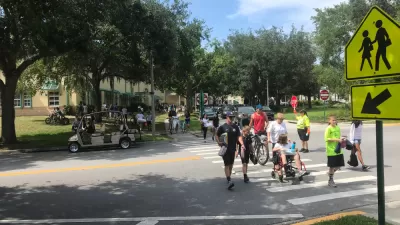A global survey shows that women around the world overwhelmingly cite fear of assault as the top reason for avoiding walking.

"In a new survey conducted by two Columbia University researchers and published by Leading Cities, people of all genders from 12 countries (including the U.S.) were asked about how safe — or unsafe — they felt while walking in their communities, and how the features of their built environments impacted their perceptions," reports Kea Wilson. Women-identified respondents overwhelmingly cited the fear of sexual assault as the top reason they "always" or "very frequently" choose to avoid walking to their destinations. "Of the small sample of gender non-binary people who responded to the survey, sexual assault also ranked as a top concern. But zero men who responded to the survey said the same."
For urban planners, this research has powerful implications that should influence the way we design streets and cities. "But the researchers behind the paper said that theirs is one of the first attempts to actually quantify just how deeply pervasive (and sometimes deeply inhibiting) fears of violence really are among women and enbies who walk — something which the predominantly male practitioners who shape the street environment don’t always fully appreciate."
Sethi underscores that those fears themselves are often just as big a barrier to women’s mobility as the actual violence and abuse women experience in the street realm. But in many communities, crime prevention strategies don’t prioritize creating environments that feel comprehensively safe — for instance, by cultivating inviting, walkable neighborhoods with lots of other pedestrians around — instead favoring isolated enforcement and prevention strategies at discrete points where crimes have already occurred, or are likely to.
"Interestingly, the features of the built environment that women say would make them feel safer while walking, like active street fronts and wide sidewalks, are not substantially different than what other genders want out of their roadways, too." The study's authors "say the survey provides more than enough evidence that the perspectives of women of diverse backgrounds needed to be better represented in the planning process, particularly in decision-making roles. And when they’re finally heard, cities may be surprised by how many people of all genders start walking for transportation."
FULL STORY: Fear of Assault Keeps Women From Walking

Planetizen Federal Action Tracker
A weekly monitor of how Trump’s orders and actions are impacting planners and planning in America.

Chicago’s Ghost Rails
Just beneath the surface of the modern city lie the remnants of its expansive early 20th-century streetcar system.

San Antonio and Austin are Fusing Into one Massive Megaregion
The region spanning the two central Texas cities is growing fast, posing challenges for local infrastructure and water supplies.

Since Zion's Shuttles Went Electric “The Smog is Gone”
Visitors to Zion National Park can enjoy the canyon via the nation’s first fully electric park shuttle system.

Trump Distributing DOT Safety Funds at 1/10 Rate of Biden
Funds for Safe Streets and other transportation safety and equity programs are being held up by administrative reviews and conflicts with the Trump administration’s priorities.

German Cities Subsidize Taxis for Women Amid Wave of Violence
Free or low-cost taxi rides can help women navigate cities more safely, but critics say the programs don't address the root causes of violence against women.
Urban Design for Planners 1: Software Tools
This six-course series explores essential urban design concepts using open source software and equips planners with the tools they need to participate fully in the urban design process.
Planning for Universal Design
Learn the tools for implementing Universal Design in planning regulations.
planning NEXT
Appalachian Highlands Housing Partners
Mpact (founded as Rail~Volution)
City of Camden Redevelopment Agency
City of Astoria
City of Portland
City of Laramie





























